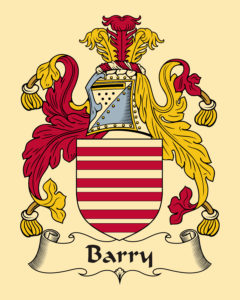We sell our products exclusively on Amazon so you can buy with confidence knowing you are protected by Amazons no hassle return policy and our 4.9 star lifetime seller rating with over 2000 reviews. Items featuring a family crest make great gifts, whether for yourself or that hard to buy for family member, friend or co-worker.
We sell Mugs, Plaques, Prints, Ceramic Tiles, Coasters, Garden Flags, License Plates and Mouse Pads featuring The Barry Coat of Arms. Click the image to go to Anglo/Irish names A section of our Amazon store.
We also sell customized license plates (add your own image and text). customizable mugs and license plates for military veterans, classic art on mouse pads and posters, a wide variety of flag license plates for nations around the world as well as pride flags and Native American tribal flags. Click here to go to our Amazon Store front.
Etymology

The surname “Barry” has roots in several regions and languages, giving it a rich and varied history. It is most commonly associated with Ireland, but its origins and earliest uses can also be traced to England and Scotland, as well as its later adoption in the United States. The name “Barry” has several possible origins, and its meaning, as well as its variations, offer insights into the movements and interactions of families across these regions over the centuries.
Irish Origins
In Ireland, the surname “Barry” is deeply rooted in Gaelic culture. The name is believed to have originated from the Gaelic name “Ó Báire,” which means “descendant of Báire.” Báire itself is derived from the word “barr,” meaning “top” or “head,” possibly indicating a person of importance or high status. Another possible origin is “Mac Báire,” meaning “son of Báire.”
The Barry family was prominent in Munster, particularly in County Cork. The Barrys were originally of Cambro-Norman descent, arriving in Ireland following the Norman invasion in the 12th century. They became one of the most influential families in the south of Ireland, acquiring large estates and playing significant roles in the political and military affairs of the region. The Barrys were granted the title of Viscount Buttevant in 1541, further cementing their status in Irish history.
English and Scottish Origins
In England, the surname “Barry” may have originated independently from the Irish form. It is derived from the Old English word “bearu,” meaning “grove” or “wood.” The name would have been given to someone who lived near a grove or a wooded area. This form of the surname is more commonly associated with southern England, particularly in the counties of Devon and Somerset.
In Scotland, the surname “Barry” can be traced to the village of Barry in Angus, near Dundee. The village’s name is thought to be derived from the Gaelic word “barra,” meaning “a summit” or “a high place,” possibly referring to the elevated position of the village. The Scottish Barrys were not as prominent as their Irish counterparts, but they were still known in the region and were associated with the area for centuries.
Earliest Recorded Use
The earliest recorded use of the surname “Barry” varies depending on the region:
- Ireland: The Barry family was first recorded in Ireland in the 12th century, shortly after the Norman invasion. The name appears in historical records as early as 1170, when Philip de Barry, a Norman knight, was granted lands in County Cork. The Barry family quickly rose to prominence in the region, establishing themselves as one of the leading families in Munster.
- England: In England, the surname “Barry” appears in records from the 13th century. The name is recorded in the Subsidy Rolls of Devon in 1332 as “de Barri.” This indicates that the name was used as a toponymic surname, referring to someone from the village or estate of Barry.
- Scotland: The earliest mention of the surname in Scotland dates to the 15th century. The Barry family is noted in the records of the Abbey of Arbroath in 1492, where the name is associated with lands in the village of Barry, Angus.
- United States: The surname “Barry” arrived in the United States with early Irish and English settlers. One of the earliest recorded instances is of James Barry, who arrived in Virginia in 1652. The name became more widespread with the influx of Irish immigrants during the 18th and 19th centuries, particularly during the Great Famine. The Barrys in the United States have since become prominent in various fields, including politics, business, and the arts.
Spelling Variations
The surname “Barry” has several spelling variations, reflecting the different linguistic and regional influences on the name over time. These variations include:
Barrie, Barre, Berry, O’Barry, De Barry, Bary, Barr, Barrey, Barri
These variations often arose due to the differences in pronunciation and spelling conventions across regions, as well as the phonetic rendering of the name by clerks and officials in historical records.
Conclusion
The surname “Barry” is a prime example of a name with multiple origins, each reflecting a distinct cultural and linguistic background. In Ireland, it is associated with the powerful Barry family of Munster, while in England and Scotland, it is linked to specific places and topographical features. The spread of the surname to the United States and its various spelling forms demonstrate how names evolve and adapt over time. Whether originating from Gaelic, Old English, or geographical roots, the surname “Barry” carries with it a rich tapestry of history and heritage.